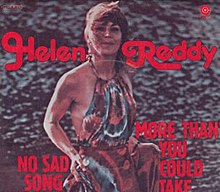No Sad Song
| "No Sad Song" | ||||
|---|---|---|---|---|
 German 7-inch single cover | ||||
| Single by Helen Reddy | ||||
| from the album Helen Reddy | ||||
| B-side | "More than You Could Take" | |||
| Released | November 1971 | |||
| Recorded | 1971 | |||
| Studio | Capitol, Los Angeles | |||
| Length | 3:00 | |||
| Label | Capitol | |||
| Songwriter(s) |
| |||
| Producer(s) | Larry Marks | |||
| Helen Reddy singles chronology | ||||
| ||||
"No Sad Song" is a song written in 1971 by Carole King and Toni Stern. It was recorded by Australian singer-songwriter Helen Reddy, appearing on her album Helen Reddy, released in November 1971.
Helen Reddy version
[edit]Release and reception
[edit]The single peaked at number 62 in January 1972 on the Billboard Hot 100 chart,[1] staying on the chart for eight weeks. "No Sad Song" showed up on the Easy Listening (Adult Contemporary) chart for 4 weeks, rising to number 32.[2] It also reached number 51 on the pop chart in Canada's RPM magazine.[3]
Village Voice critic Robert Christgau described "No Sad Song" as a minor hit for Reddy, and a missed chance for King to have a "tougher" song on one of her own albums.[4] Stern's lyrics for "No Sad Song" describe the history and the death of a ladies' man, "stabbed in his bed" where he had brought so many women.[5] The New Yorker called the song "Brecht-and-Weillian", referring to Bertolt Brecht and Kurt Weill, famous for the murder-minded song "Mack the Knife". "No Sad Song" was called a "ballad about the unlamented murder of a rake."[6]
"No Sad Song" was released in North America on 7-inch, 45 rpm vinyl with Reddy's self-penned song "More than You Could Take" on the B-side. In early 1972, several European printings of the single were released. Reddy recorded a French-language version of "No Sad Song" translated to "Plus de chanson triste", making it available in both languages in France.[7]
The song is one of two low-performing singles that Reddy put out in 1971, the other being her version of "Crazy Love" by Van Morrison, which rose to number 51 in September 1971. Reddy's first big success was "I Don't Know How to Love Him" which hit number 12 in June 1971, so the next two singles were considered disappointments. It was not until 1972's "I Am Woman" that Reddy hit the top of the charts, the song appearing in frustrating fits in June and September charts then finally breaking through to number 1 in December.[8] Reddy said later to Ms. magazine's Susan Lydon that "No Sad Song" was too antagonistic: "it never took off because it put down men too much."[9]
Charts
[edit]| Chart (1971-1972) | Peak
position |
|---|---|
| US (Billboard Hot 100)[1] | 62 |
| US (Billboard Easy Listening)[2] | 32 |
| Canada (RPM)[3] | 51 |
Other versions
[edit]- French singer Sheila covered Reddy's French-language version as "Plus de chansons tristes" (making it plural "Songs") for her 1972 album Poupée de Porcelaine (Porcelain Doll). Pierre Delanoë wrote the French lyrics about a "suburban Don Juan".[10]
- Swedish singer Anni-Frid "Frida" Lyngstad recorded the song in January 1972 as one of her last solo sessions for EMI Records. The lyrics were written by her new manager Stig Anderson, with the song titled "Kom och sjung en sång" (translation: Come and Sing a Song). This was released as a B-side to Lyngstad's final EMI single "Vi är alla bara barn i början". Her future ABBA bandmates Agnetha Fältskog and Björn Ulvaeus provided backing vocals on both songs in a recording session produced by Benny Andersson, also a future ABBA member. Jazz musician Kjell Öhman played accordion and piano.[11][12] The single did not chart, but the B-side was ranked at number 14 in the Toppentipset list published in the tabloid Aftonbladet.[13]
References
[edit]- ^ a b "Chart History: Helen Reddy". Billboard. Archived from the original on 10 September 2020. Retrieved 27 August 2020.
- ^ a b Whitburn, Joel (2007). Joel Whitburn Presents Billboard Top Adult Songs, 1961-2006. Record Research Inc. pp. 226, 805. ISBN 978-0-89820-169-7.
- ^ a b "RPM 100 Singles". RPM. 22 January 1972.
- ^ "Carole King: Five Million Friends". Robert Christgau. Archived from the original on 29 July 2018. Retrieved 27 August 2020. First appeared in November 1972 in Newsday.
- ^ "Songs: No Sad Song". Carole King. Archived from the original on 10 September 2020. Retrieved 27 August 2020.
- ^ "Review". The New Yorker. Vol. 49, no. 111. 1972. p. 138.
- ^ Reddy, Helen (2006). The Woman I Am. Penguin. p. 102. ISBN 9781440649868. Archived from the original on 10 September 2020. Retrieved 27 August 2020.
- ^ Bronson, Fred (2003). The Billboard Book of Number One Hits. Billboard Books. p. 334. ISBN 9780823076772. Archived from the original on 10 September 2020. Retrieved 28 August 2020.
- ^ Lydon, Susan (July 1973). "And Now Here's... Helen Reddy". Ms. Vol. 2. p. 28.
- ^ Quinonero, Frédéric (2018). Sheila, une histoire d'amour (in French). City Edition. pp. 197–199. ISBN 9782824630434. Archived from the original on 10 September 2020. Retrieved 30 August 2020.
- ^ van Drongelen, Remko (2022). Frida Beyond ABBA. RvD. pp. 192–193. ISBN 978-90-9035304-3.
- ^ Magnus Palm, Carl (26 August 2010). "English translation of liner notes: Frida 1967-1972". Translated by Peterson, Sven Åke; Whittingham, Grant. Archived from the original on 27 March 2019. Retrieved 11 December 2024.
- ^ Kungliga biblioteket. "AFTONBLADET 1972-04-03". Svenska tidningar (in Swedish). Retrieved 11 December 2024.
External links
[edit]- Helen Reddy performs on television in 1972
- Helen Reddy – No Sad Song Lyrics on Genius
